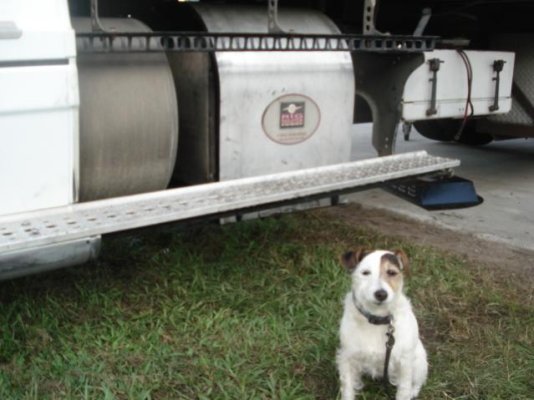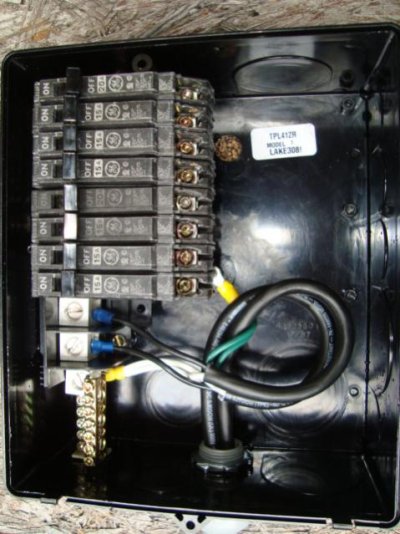UPDATE: We're still busy working on the Moby project. We're finally about ready to fire up the APU generator for the first time come Monday - in fact, Maggie has signed off on the project (photo). The other photo is of the panel, which I wired the generator to (for the 8 circuits we'll have inside). There are four wires coming off the generator, two black and two white. The two blacks are wired into each branch of the panel, and the two whites are joined in the panel. The panel comprises 8 each, 15A circuits (110V circuits).
I haven't wired these up yet, but the breakers are in place and ready. I'm figuring one circuit each for outside outlets, inside outlets, an overhead light circuit, a potable water-pump circuit, microwave circuit, refrigerator circuit, plus 2 more since something will undoubtably occur to me (e.g. a use for those two remaining circuits). Anyway, but this is what I've thought of thus far.
I've also bought a cut off so I can break the circuit between the generator and the panel. The basic idea behind this is to let me plug the truck into shore power, e.g. a 220V 50A circuit. Since we're plumbing for shore water, when the truck is parked either at our building, or at a campground, we can attach a water hose and the 50A extension (a 25' 8/4 with 4-prong twist lock connectors at each end). This means electricity for keeping beer cold as well as the microwave for popcorn, plus lighting, etc. A matching 4-prong twist lock in a box beneath the truck and an RV outlet attached to the side of our metal building complete the set up.
Of course, I won't have AC in the box unless the APU is running since it's a mechanical system, which is pretty much identical to what is in a car. E.g. an engine driven compressor, the condenser paired with the radiator, along with an evaporator and a heater core with a fan mounted inside the box (instead of under the dash of a car). It's a pretty nifty setup. Thus, I'm thinking of getting one of those portable AC units for the purpose of keeping the box cool by running it off shore power when the truck is plugged into the building. There, that's one of the two remaining circuits used up - and I'm bound to think of something else for the other - maybe a circuit dedicated to AC chargers?
Our model airplane and helicopters fly with 50V 5A battery packs and charging a few of these will run a battery down to nothing in no time. Speaking of chargers, Moby has a battery bank comprising four type-31 batteries wired in parallel, a massive 12V battery. Best fo all, the APU has a 60A alternator and will autostart and recharge if the voltage goes too low. Thus, we should have plenty of juice for charging our model's battery packs!
What is it they say about the best laid plans of mice and men? Tempus fugit.
I haven't wired these up yet, but the breakers are in place and ready. I'm figuring one circuit each for outside outlets, inside outlets, an overhead light circuit, a potable water-pump circuit, microwave circuit, refrigerator circuit, plus 2 more since something will undoubtably occur to me (e.g. a use for those two remaining circuits). Anyway, but this is what I've thought of thus far.
I've also bought a cut off so I can break the circuit between the generator and the panel. The basic idea behind this is to let me plug the truck into shore power, e.g. a 220V 50A circuit. Since we're plumbing for shore water, when the truck is parked either at our building, or at a campground, we can attach a water hose and the 50A extension (a 25' 8/4 with 4-prong twist lock connectors at each end). This means electricity for keeping beer cold as well as the microwave for popcorn, plus lighting, etc. A matching 4-prong twist lock in a box beneath the truck and an RV outlet attached to the side of our metal building complete the set up.
Of course, I won't have AC in the box unless the APU is running since it's a mechanical system, which is pretty much identical to what is in a car. E.g. an engine driven compressor, the condenser paired with the radiator, along with an evaporator and a heater core with a fan mounted inside the box (instead of under the dash of a car). It's a pretty nifty setup. Thus, I'm thinking of getting one of those portable AC units for the purpose of keeping the box cool by running it off shore power when the truck is plugged into the building. There, that's one of the two remaining circuits used up - and I'm bound to think of something else for the other - maybe a circuit dedicated to AC chargers?
Our model airplane and helicopters fly with 50V 5A battery packs and charging a few of these will run a battery down to nothing in no time. Speaking of chargers, Moby has a battery bank comprising four type-31 batteries wired in parallel, a massive 12V battery. Best fo all, the APU has a 60A alternator and will autostart and recharge if the voltage goes too low. Thus, we should have plenty of juice for charging our model's battery packs!
What is it they say about the best laid plans of mice and men? Tempus fugit.
Attachments
Last edited:




